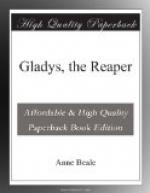He told him everything that had happened to Netta, from the period of her being left in the lodgings in his parish, until her death at the farm. He felt that the one hope of softening Howel, or doing him any good, was through his love for his wife; he therefore narrated simply what she had suffered and said; he told how that she had been hourly expecting him back, until his one short note; how she had listened for his footsteps, and refused to leave the place where he had left her, until he came. All that her friends had done for her, was introduced incidentally; Howel understood that she had been taken to her relations again, as the prodigal son to his father, but he was not told so.
Rowland did not spare him, however, as regarded Netta. He knew him to be utterly callous as to the follies and crimes of his life; he must, therefore, be made conscious of their weight, through their effects upon others; he knew that they had been the cause of Netta’s death, and this would show him the enormity of sin if nothing else would.
As he detailed the wanderings of poor Netta’s mind, and then her anxious inquiries of him of the way of salvation for Howel, as well as herself, he was visibly affected. Not even his determination that Rowland should not see his emotion could conceal it; but he did not speak a word. He listened to the end, and then, without uncovering his face, he said in a voice tremulous from emotion,—
‘Thank you; now go; and come back to-morrow; I would be alone with her.’
‘And to-morrow I must bring your mother,’ said Rowland
‘No, no, let me see you alone,’ was the hasty reply.
‘God bless you, Howel, and grant you His help,’ said Rowland, passing before the stooping figure.
There was no reply, so, with a heavy sigh and an inward prayer, Rowland left the cell.
CHAPTER LII.
THE PENITENT HUSBAND.
The following morning, Rowland again took Mrs Jenkins to her lodging and left her there. It was with very great difficulty that he persuaded Mrs Jenkins to remain behind, and only under a promise to prevail upon Howel to see her immediately after his interview with him.
As he expected, he found Howel almost as cold and impassive as on the previous day. But he fancied that this was an assumed manner, and that he could trace workings of more natural feelings underneath. He was at least civil to him, and instead of receiving him as before, said,—
’I thought you would never come; but I suppose prosperous people are never in a great hurry to visit the unfortunate. Ha! ha! Certainly my reception-rooms are not very inviting.’
’I came as soon as I could gain admittance. I wish you would believe, Howel, that I am very anxious to be of any use to you that I can. You know that you refused to see me before.’




